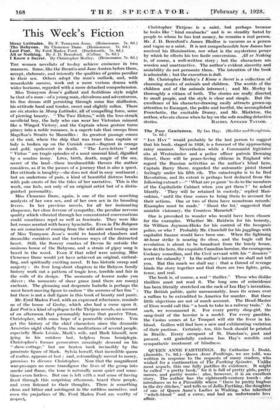This Week's Fiction
I Know a Secret. 13y Christopher Morley. (Heinemann. 7s. 6d.) THE women novelists of to-day achieVe eminence in two Manners. Some like the Brontes and Jane Austen before them,, accept, elaborate, and intensify the qualities of genius pecidiar to their sex. Others adopt the man's outlook, and, with remarkable success, work out a more various drama with wider horizons, regarded with a more detached comprehension. Miss Tennyson Jesse's gallant and fastidiima stYle might be that of a man-of a young man, ehivalrous and adVenturous, his fine dream still persisting thiongh some fine disillusion; his attitude hard and tender, sweet and slightly sullen. There are six stories in Many Latitudes; all of compelling force,' some of piercing beauty. " The Two- Helens," with the love-struck sacrificial boy, the lady who can wear-her Victorian raiment like a Winged Victory; and the Captain whose gesttire turns piracy into a noble romance, is a superb tale that sweeps from Magellan's Straits to MarSeilles : its greatest passage comes at the end, where the ship that was truer than captain or lady is broken up on the Cornish coast--.--flagrant in orange and gold, opalescent in death. " The Love-letters " and ".Virtue " are tragic oPiiodes of a most unusual kind, dignified by a sombre irony: Leve, birth, death, magic of the sea, secret of the land-these inexhaustible themes the authOt considers, as if in the tenses of a journey that is also a quest. Her attitude is haughty—she does not deal in easy sentiment ; but an undertone of pain, a kind of beautiful. distress breaks with pale crests of fire the tides of her narrative. This is the work, one feels, not only of an original artist but of a distin guished personality.
Miss Clemente Dane, again, is one of the most searching analysts of her own sex, and of her own sex in its brooding fevets. In her preVious novels, for all her insinuating eloquence, her close fervour of sympathy, the peculiar nervous quality which vibrated through her concentrated conversations could sometimes repel as well as fascinate. They were like hot rooms scented with heavy hyacinths. Even in The Babyons we-are Conscious of coming from the wild airs and tossing seas of Miss Tennyson Jesse's world to haunted chambers and dreamlike corridors and the tortuous ways of the distracted heart. Still, the flowery combes of Devon lie outside the ominous house of the Babyons, and a strain of gipsy song is heard in the wood. Even if that relief were missing, Miss Clemence Dane would yet have achieved an original, enthral- ling, and spiritually exciting novel. It has historic sweep and majesty : its four long-short chapters in the Babyon family history work out a pattern of tragic love, terrible and fair in the coils of its design. The moments of horror make you- shiver ; the moments of sheer grace (and there are many) enchant. The gleaming and desperate Isabella is perhaps the most heart-moving figure to endure " the sorrows of her line " but there is not a dull figure in this book of beauty and panic. Mr. Ford Madox Ford, with an expressed reluctance, reminds us of the house of Groby, which also had a curse upon it. Last Post is a kind of epilogue to the Tietjens novels, an account of an afternoon that presumably leaVes that passive Titan, Christopher, with some hope of a peaceable existence. You get the history of the chief characters since the dramatic Armistice night chiefly from the meditations of several people, especially Marie Leonie, Mark's wife, and Mark himself, now wing in his outdoor hut, helpless from hemiplegia. Christopher's former persecutors amazingly descend on his " show-cottage," but are beaten back invincibly by the prostrate figure of Mark. Sylvia herself, that incredible queen of malice, appears at last ; and, astoundingly moved to mercy, promises to divorce Christopher. Now that the magnificent war-passages no more transfigure the lives of the group into smoke and flame, the tone is naturally more quiet and some- times even listless. But one is left with a real sense of having lived through this surprising afternoon, heard these people,- and even listened to their thoughts. Thete _is something n clean and bitter and astringent in the ruthless narrative, and even the prejudices of Mr. Ford Madox Ford are worthy of respect. Christopher Tietjens: is a saint, but perhaps because he loPks like " kiurd3ricalsacks" and so steadily hated by.
people to whom he has lent money, he remains a real person.
Mr. J. D. Beresford's _James Bledloe is vacuous as a person
and vague as a saint. It is not comprehensible how James has. received his illumination, nor what is the mysterious powfr. by which he effects his too facile conversions. All or. Nothing is, of course, a well-written story.; but:the characters are; wooden and unattractive. The author's evident sincerity and amiability do not permeate them. The intention of the book is admirable ; but the execution is dull. - „ - - Mr. Christopher Morley's .1 Know a Secret. is a collection.01 charming stories of animals and children. The worlds of the children and of the animals intersect ; and Mt. Mqrley is. thoroughly a citizen of both. The stories ire really directed_ to small people; and the style .is clear and. simple. But the excellence of his character-drawing easily attracts grown-up.
attention to Escargot, the polite and tactful, the 'accomplished Fourchette, _the excitable Donny, and Mr. Mistletoe,_ the author, who ate cheese when he lay on the sofa reading detective






































 Previous page
Previous page